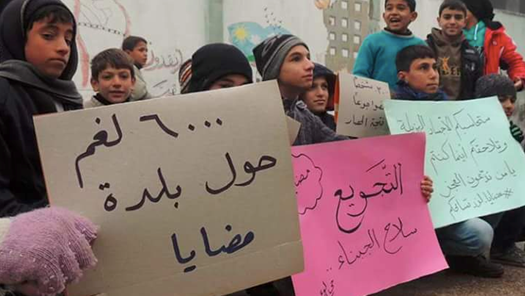PHOTO: Protest this month in Madaya — “Starvation is the Weapon of Cowards”
The headlines long ago left the besieged residents of Madaya, northwest of Syria’s capital Damascus. At the start of the year, international attention was drawn by the deaths of scores from starvation.
But the death toll was limited — although it has not stopped — after the Assad regime bowed to the bad publicity and allowed limited supplies of assistance into the town, surrounded by the Syrian military and Hezbollah since July 2015. So the media moved to other arenas of siege and bloodshed, notably Aleppo.
Another limited delivery of assistance was made in late September to Madaya. But it is far from enough to ease the suffering and hunger.
Bahira al-Zarier and Justin Schuster of Syria Direct report on one sign of desperation — the search for salt:
Residents in the regime-blockaded Outer Damascus town of Madaya are breaking apart old bread ovens and sidewalks in search of salt, a last-ditch effort to fight the effects of severe low blood pressure brought on by months of crippling siege, one of the city’s last remaining medical professionals told Syria Direct on Tuesday.
Since July 2015, the 40,000 residents of Madaya, once a mountain resort popular with vacationing Damascenes, have lived in an open-air prison, with Syrian army and Hezbollah fighters encircling the town with snipers, barbed wire and thousands of landmines. This past winter, the Syrian regime’s siege of Madaya led to mass starvation, as residents of the town survived on grass and leaves.
Although intermittent aid deliveries provide some relief from the siege, town residents say the convoys have lacked needed supplies including vaccines, anti-inflammatory medicine, painkillers and salt—a necessary supplement for the town’s hunger-stricken populace, who have reported dizziness and fainting as a result of low blood pressure, also known as hypotension.
In turn, Madaya residents are looking for salt literally wherever they can.
“People are crushing rocks that are used to pave sidewalks or breaking apart old bread ovens because they’re made from a mixture of dirt and salt,” Dr. Mohammad Darwish, a dentist and Madaya’s most experienced medical professional who works at the only hospital in the town, told Syria Direct on Tuesday.
Ideally, Madaya’s medical workers, like Darwish, want aid organizations to provide the town with hypotension medicine, which is more effective at preventing the effects of low blood pressure than salt. But local traders who deal directly with Hezbollah fighters manning the town’s eight checkpoints say that is impossible.
“They’ll never allow something valuable like medicine to make it into Madaya,” Hussam, a Madaya trader, told Syria Direct on Tuesday. Hussam did add that select Madaya families can purchase salt, at a price of $100 per kilogram, via Hezbollah guards.
“[Hezbollah] will allow 1kg or 2kg of salt to go into the city, but never any more,”
“They’ll only allow this to take place because they can get the salt for so cheap and charge it at a massive markup.”

